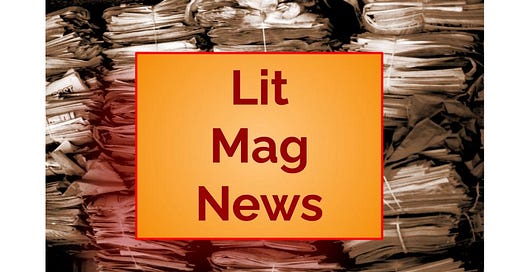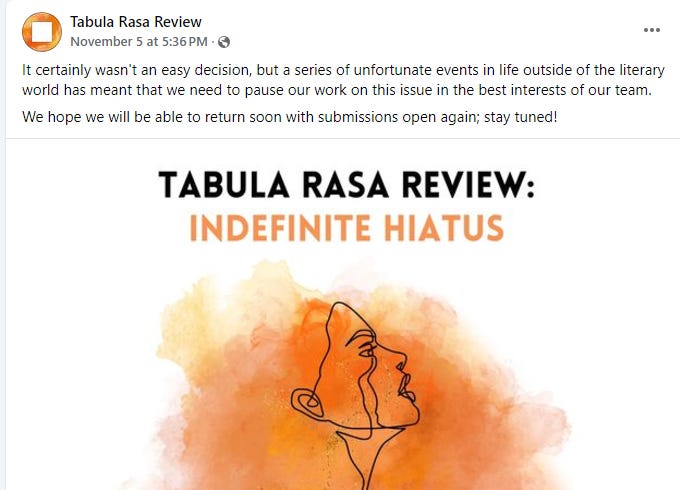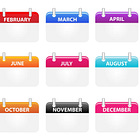Stop! In the Name of Lit Mags!
Ongoing boycott of Israeli cultural institutions; opposition to boycott; thoughts on "the neocolonized literary citizen," pretentious writing, bad grammar; a new anthology; new lit mag; and more
Welcome to our bi-weekly news roundup!
Greetings Lit Maglicopters,
In our last news round-up I reported on the open letter Refusing Complicity in Israel’s Literary Institutions. The letter, organized by six literary groups and signed by a wide range of authors, states,
Israeli cultural institutions, often working directly with the state, have been crucial in obfuscating, disguising and artwashing the dispossession and oppression of millions of Palestinians for decades.
We have a role to play. We cannot in good conscience engage with Israeli institutions without interrogating their relationship to apartheid and displacement.
As of today the list has grown to 24 pages of signatories. The Palestinian Festival of Literature cites this as “more than 6,000 authors.”
“Such an unprecedented outpouring,” write Sandy English and David Walsh at the World Socialist Website, “speaks to more than the reaction of a layer of writers and professional workers. The open letter gives voice and focus to the anger and horror felt by millions…”
Meanwhile at a different socialist site, The Militant, Seth Galinsky calls upon readers to “[d]efend culture” and oppose the boycott. Galinsky writes,
Defending culture, free-ranging debate and the right of journalists and artists to state the truth as they see it is crucial for working people to chart a road forward amid the deepening social convulsions and wars of the imperialist epoch. That is why the campaign by the Palestine Festival of Literature to organize an international boycott of Israeli cultural institutions must be opposed.
In perhaps a rare moment of agreement between a socialist outlet and The Wall Street Journal, Adam Kirsch echoes opposition to the boycott. He writes,
In a public letter, these writers declared that they will not allow their books to be translated into Hebrew, contribute to Israeli magazines and newspapers, attend conferences or give readings in Israel, or work with Israeli publishers and literary agents…The most ironic thing about the literary boycott of Israel…is that it betrays a lack of faith in literature itself.
Various interviews, essays and blog posts by editors also caught my eye this week.
In the latest edition of Mizna, Executive Editor George Abraham examines the role of editors in our current moment as well as “the neocolonized literary citizen.”
…The neocolonized literary citizen is…the kind of liberal that engages in a daily performance of becoming the ideal representation of themselves, and furthermore, works to service, repair, and otherwise maintain the imperial death machine that produces such a regime of neoliberal representation. In other words, they are (often) not the literal CIA, but they’re comfortable uncritically supporting the new DEI-washed faces of the Iowa Writers’ Workshop, the Paris Review, the Stegner program, and other spaces with such histories of statist infiltration and political sanitization.
At Orca, Editor Joe Ponepinto asks Why Do So Many Emerging Writers Try To Sound Pretentious? He writes,
[T]here are many writers who adhere to [a] pompous way, and they have and probably will always have an audience (but not at Orca).
…But I’m speaking to the others who still have that childhood impression nagging them as they write: if I use a three-syllable word instead of a two-syllable one, my writing will sound more intelligent.
…Think of literary writing as going deep, not wide. It’s writing with focus and purpose, drilling down to the smallest meaningful detail, not a hazy view of some far-off horizon. Literary goes below the surface of the writing into character and meaning.
At Witcraft
has a pithy post about The death of past tense in speech,Text - What is common now is ‘I text him yesterday’. Whatever happened to texted? How much time was saved in that process? What’s next? ‘I had sex with her yesterday’ becomes ’I sex her yesterday’?
Perhaps the modern zeitgeist is that all events exist in time simultaneously, so tense has become irrelevant and lies in the same graveyard as spelling and punctuation.
At South 85 Journal Leslie Pietrzyk interviews Julie Marie Wade about her new “nonfiction novella that chronicles one young woman’s quarter-century love affair with The Mary Tyler Moore Show.” Portions of this collection appeared in Tupelo Quarterly, Prairie Schooner and elsewhere. Advises Wade,
[D]on’t let rejections and disappointments (which every person and every artist experience) stop you from pursuing what you love. I am thousands of rejections deep in my 21 years of submitting work for publication. I have lost far more contests than I have won or could ever hope to win—as is inevitable—but I work hard to learn from those rejections, to let them spur me forward rather than hold me back.
A new anthology got some press. At Full Stop Nico Millman has reviewed Queer Palestine. Calling the anthology “[s]mall but immensely valuable,” Millman writes,
The editors of this nearly 100-page zine—a trio of Palestinian scholars, organizers, and cultural workers—collaborated with Pinko Magazine, a US-based collective that publishes…writings that explore the liberatory horizon of “gay communism.” Moving across a diverse set of materials that include a manifesto, interviews, creative nonfiction, photography, and multimedia art, Queer Palestine [foments] urgent collective action…while also documenting the everyday practices of living that shape contemporary queer Palestinian selfhood.
A new lit mag from the outback also got press. Splinter is a new journal from Australia. Daniela Frangos writes in Broadsheet,
The 192-page first issue features new fiction, non-fiction, poetry and literary criticism from 25 writers around Australia – including seven from SA – Nigeria and Berlin. There’s an essay on sonic environmental destruction; a critique of the Eurocentric lens often applied to First Nations work; and a piece that asks why literary sad girls are having such uninspiring sex.
And Tabula Rasa Review has announced an indefinite hiatus.
Finally, Best Microfiction is now accepting submissions!
The Best Microfiction anthology series considers stories of only 400 words or fewer.
…We are accepting submissions from lit mag editors on a rolling basis from November 2nd, 2024 and continuing through to a deadline of December 15th, 2024. Please feel free to nominate stories that have yet to be published in December, as they are stories published in 2024.
As for us, much is on the calendar this week. We’ve got a Lit Mag Chat session tomorrow, plus our discussion of Copper Nickel, and then an interview with Editor Wayne Miller later in the week. You can learn about all of these events here:
For our Lit Mag Reading Club next month we will be reading Five Points. I will share any discount code for the journal if & when I have it. If you don’t yet know about our Reading Club, check it out:
I’ll also be posting the December schedule soon, so keep your eyes peeled. And if there is ever an editor you’d like me to interview, a panel you’d like me to try to organize, or a craft/publishing/editing topic you think we should cover, let me know!
And that you makers of mind maps and manifesters of moons and other mystical machinations, you chasing the dog tails of your dreams each morning as you wonder at the whispers of those other secret sleep-awakened selves, you with one eye on a book and the other on your screen, you with all eyes on the infinite as you wander through its always-there windings, you an atom, you split apart, you in a fizz of electrical current zapping through the illusions of all this endless silly separateness, you slowly unraveling the subconscious sludge of life within the simulation and you in quantum perfection, a being both wave and particle and maybe something else, a flag flapping, a single hand clapping, a goodbye to particular past prescriptions for paths that do not serve you, you and you, everywhere and wondrous, connected and interwoven, each of every one and every one of each of us, so very here, now, and isn’t it something, is the news in literary magazines.
Have a most dazzling week, pals.
Fondly,
Becky







That you express no horror at the racism of a this boycott and that the pretense on which it is based is painfully immoral, performative, and self-aggrandizing--not to mention that it is DESTROYING the lives of Jewish writers and their ability to earn a living, for no other reason than that they are Jewish, makes me feel the desire to instantly cancel this newsletter from my feed. That's not boycotting; that's disgust. Perhaps Sally Rooney is embittered by her inability to write an interesting novel, but her fervent antisemitism is violent and evidently viral. The whole thing is shameful. My grandfather testified before HUAC and, pleading the First, refused to answer the question of whether he was a Communist. Pleading the First meant that the government had NO RIGHT to ask him his political or any other affiliations. He went to jail for a year because of it. Now THAT is principled behavior, not this farce boycott. He was a Socialist, a Jew, and one of the most fundamentally decent men who ever walked the planet. His name was Albert Maltz. It would do these ignorant boycotters some good to--I dunno--read some history. Enough. Enough! And enough debating whether it is legitimate to cut artists off from their living because of their beliefs and their race--yes, I said it--their race. That's what this is about, make no mistake. It's bad enough we've elected a monstrous would-be fascist as president, now we have a fascist, intellectually dishonest and morally bankrupt group on the so-called left that is rending the fabric of society quite efficiently.
The common thread connecting the excerpted articles seems to be performative bs on the part of academics and self-appointed "public" intellectuals. Thank you for quoting George Abraham. I've been feeling exactly the way he does for years, and I guess it took Trump's return in 2024 to bring out the rot at the core of academic liberalism and MFA programs, or at least embolden people to talk about DEI-washing. Diversity? Seems like more color, even less radicalism. In fact, the identity politics have been toxic for years, and worse, a mask for ongoing social privilege and class bias in the academy. The Iowa Workshop is a country club, along with every other program Abraham named, and the editors of most university affiliated magazines are tenured champions of mediocrity, nepotism, and conformity. Didn't the AWP just announce it was hosting a panel on "creative use of AI in the classroom"? Way to roll over and play dead, AWP! Meet your new overlords, Elon Musk and Peter Thiel. Anyhow, thanks for this excerpt about editors and other "neocolonized literary citizens": "They are (often) not the literal CIA, but they’re comfortable uncritically supporting the new DEI-washed faces of the Iowa Writers’ Workshop, the Paris Review, the Stegner program, and other spaces with such histories of statist infiltration and political sanitization." Seriously, when the AWP caves within months of ChatGPT's release, there's nothing to say but that the MFA ship is sinking, and this country's literary landscape was polluted long before Trump decided to napalm it.